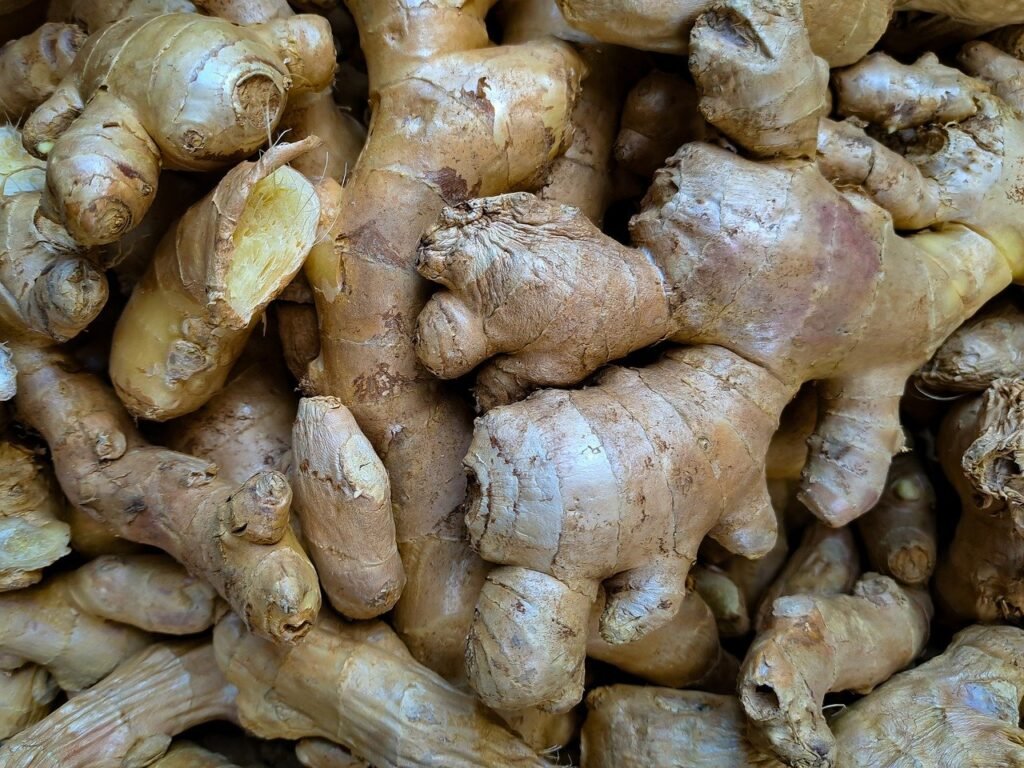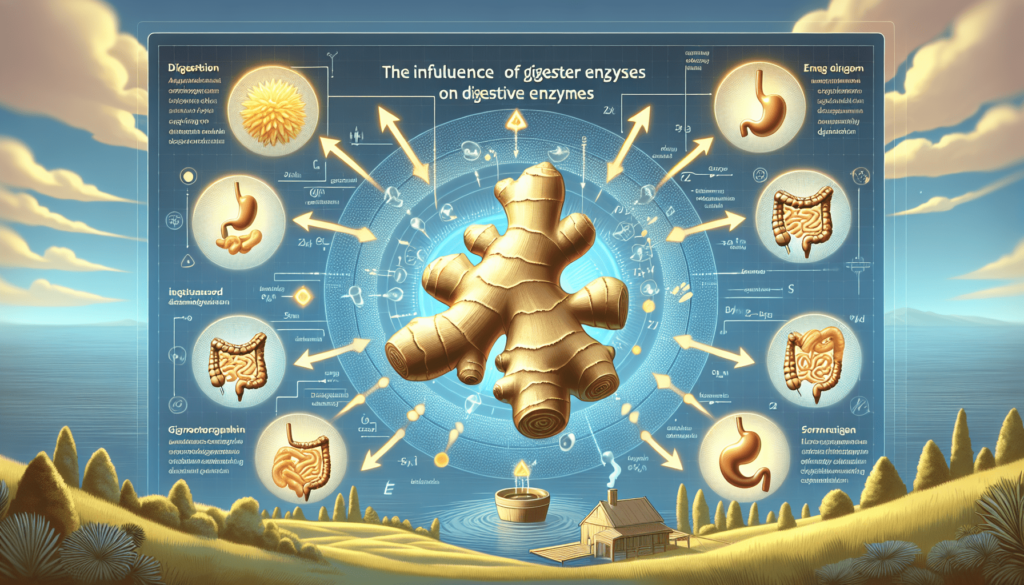Did you know that ginger, that wonderful root often used as a spice or in herbal teas, can have a significant impact on your digestive enzymes? Digestive enzymes play a crucial role in breaking down the food you eat, allowing your body to absorb nutrients effectively. Ginger has been found to stimulate the production and activity of these enzymes, aiding in digestion and relieving symptoms such as bloating and indigestion. So, next time you have a meal, consider adding a dash of ginger to give your digestive system a friendly boost!

This image is property of pixabay.com.
Overview of Ginger
Definition and Description of Ginger
Ginger, scientifically known as Zingiber officinale, is a flowering plant that is widely used as a spice and medicinal herb. It has a pungent and spicy taste, which is commonly associated with Asian cuisine. The rhizome, or the underground stem, of the ginger plant is the part that is most commonly used.
Ginger has a long history of traditional use in various cultures and has been recognized for its numerous health benefits. Apart from being a popular ingredient in culinary preparations, it has also been used for its medicinal properties, particularly in relation to digestion.
Composition and Active Ingredients of Ginger
Ginger contains various bioactive compounds that contribute to its therapeutic properties. These active ingredients include gingerol, shogaol, and zingerone, which are responsible for the plant’s distinctive aroma and flavor. Ginger also contains volatile oils, such as zingiberene and bisabolene, as well as vitamins, minerals, and antioxidants.
The active compounds in ginger have been found to exhibit anti-inflammatory, antioxidant, and antimicrobial properties, among others. These beneficial components provide the basis for ginger’s impact on digestive enzymes and its overall effect on digestion.
Digestive Enzymes
Definition of Digestive Enzymes
Digestive enzymes are specialized proteins that facilitate the breakdown of large food molecules into smaller components. They are produced by various organs in the digestive system, including the salivary glands, stomach, pancreas, and small intestine. Digestive enzymes play a crucial role in the process of digestion, allowing the body to absorb and utilize nutrients from food.
Types and Functions of Digestive Enzymes
There are several types of digestive enzymes, each responsible for breaking down specific types of food components. Some of the main enzymes involved in digestion include:
- Amylase: Breaks down carbohydrates into simple sugars.
- Protease: Breaks down proteins into smaller peptides and amino acids.
- Lipase: Breaks down fats into fatty acids and glycerol.
- Lactase: Breaks down lactose, the sugar found in milk and dairy products.
- Sucrase: Breaks down sucrose, the sugar found in table sugar and many fruits.
These digestive enzymes work together to ensure the efficient breakdown and absorption of nutrients, allowing the body to extract the necessary sustenance from food.
Effects of Ginger on Digestive Enzymes
Increase in Digestive Enzyme Secretion
Research has shown that ginger can increase the secretion of digestive enzymes in the gastrointestinal tract. The active compounds in ginger stimulate the production and release of digestive enzymes, promoting efficient digestion and nutrient absorption.
Studies have demonstrated that the consumption of ginger can enhance the secretion of enzymes such as amylase, protease, and lipase, which play vital roles in breaking down carbohydrates, proteins, and fats, respectively. This increase in enzyme secretion helps to optimize the digestive process and improve overall digestive health.
Enhancement of Enzymatic Activity
In addition to increasing enzyme secretion, ginger has also been found to enhance the activity of digestive enzymes. The bioactive compounds found in ginger can interact with these enzymes and improve their efficiency in breaking down food components.
For example, research has shown that gingerols, one of the active compounds in ginger, can activate and potentiate the activity of pancreatic lipase. This enzyme is responsible for the breakdown of dietary fats, and its enhanced activity can contribute to improved fat digestion and absorption.
Stimulation of Digestive Enzyme Production
Another way in which ginger impacts digestive enzymes is by stimulating their production. Ginger has been found to modulate gene expression in the cells that produce digestive enzymes, leading to increased production of specific enzymes.
Research has shown that ginger can upregulate the expression of genes that are involved in the production of amylase and lipase, among others. This stimulation of digestive enzyme production ensures a constant supply of these enzymes, promoting efficient digestion and nutrient absorption.
Mechanism of Action
Interaction with Gastrointestinal Tract
One of the mechanisms by which ginger impacts digestive enzymes is through its interaction with the gastrointestinal tract. When ingested, the active compounds in ginger come into direct contact with the walls of the digestive system, including the stomach and intestines.
Gingerols and other bioactive components in ginger can bind to receptors in the gastrointestinal tract, triggering various signaling pathways. These pathways can stimulate the secretion of digestive enzymes, enhance their activity, and promote overall digestive health.
Modulation of Enzyme Expression and Release
Ginger also exerts its effects on digestive enzymes by modulating the expression and release of these enzymes. The active compounds in ginger can interact with specific genes and proteins involved in the production and release of digestive enzymes.
By influencing gene expression and protein synthesis, ginger can increase the production and release of digestive enzymes. This modulation ensures a sufficient supply of enzymes for optimal digestion and nutrient absorption.

This image is property of pixabay.com.
Benefits of Ginger on Digestion
Improved Nutrient Absorption
The impact of ginger on digestive enzymes ultimately leads to improved nutrient absorption. By increasing enzyme secretion, enhancing enzymatic activity, and stimulating enzyme production, ginger aids in the breakdown of food components into smaller, more easily absorbed molecules.
Efficient digestion and nutrient absorption are essential for maintaining overall health and well-being. Ginger’s ability to optimize the digestive process ensures that nutrients are properly absorbed and utilized by the body, maximizing their nutritional benefits.
Relief from Digestive Disorders
Ginger has long been used as a natural remedy for various digestive disorders. Its ability to promote digestion and regulate digestive enzyme activity can provide relief from conditions such as indigestion, bloating, and stomach discomfort.
Studies have shown that ginger can help alleviate symptoms of dyspepsia, a common digestive disorder characterized by recurring pain or discomfort in the upper abdomen. The anti-inflammatory and antioxidant properties of ginger may contribute to its ability to relieve digestive symptoms and promote overall gastrointestinal health.
Alleviation of Inflammation in the GI Tract
Inflammation in the gastrointestinal (GI) tract can disrupt the normal functioning of digestive enzymes and impair the overall digestive process. Ginger has been found to possess anti-inflammatory properties that can help reduce inflammation in the GI tract.
The active compounds in ginger, particularly gingerols, have been shown to inhibit the production of pro-inflammatory cytokines, which are molecules involved in the inflammatory response. By reducing inflammation, ginger can help normalize the activity of digestive enzymes and improve digestion.
Research Studies and Findings
Scientific Studies on Ginger and Digestive Enzymes
Numerous scientific studies have explored the impact of ginger on digestive enzymes and digestion. These studies have utilized various methods, including in vitro experiments, animal models, and human clinical trials, to assess the effects of ginger on enzyme secretion, activity, and production.
Research has consistently demonstrated that ginger can increase the secretion, enhance the activity, and stimulate the production of digestive enzymes such as amylase, protease, lipase, and others. These findings provide substantial evidence for the positive impact of ginger on digestive enzymes and digestion.
Results and Conclusions from the Research
The results of these research studies consistently support the beneficial effects of ginger on digestive enzymes and digestion. Ginger has been shown to promote enzyme secretion, enhance enzymatic activity, and stimulate enzyme production, leading to improved digestion and nutrient absorption.
Furthermore, studies have indicated that ginger can provide relief from digestive disorders, alleviate inflammation in the GI tract, and contribute to overall gastrointestinal health. These findings highlight the potential of ginger as a natural remedy for various digestive issues and the importance of incorporating it into a healthy diet.

This image is property of pixabay.com.
Recommended Dosage and Forms of Ginger
Appropriate Amount of Ginger Consumption
While there is no universally established dosage for ginger, various factors should be considered when determining the appropriate amount of ginger to consume. These factors include age, overall health, and the specific health condition being targeted.
In general, a daily intake of 1-3 grams of ginger is considered safe and effective for promoting digestive health. This can be consumed in various forms, including fresh ginger, powdered ginger, ginger extracts, capsules, or teas.
It is important to note that excessive consumption of ginger may lead to digestive discomfort or interact with certain medications. It is always best to consult with a healthcare professional before significantly increasing ginger intake or if you have any underlying health conditions.
Different Ways to Consume Ginger
Ginger can be incorporated into the diet in various ways to reap its digestive benefits. Some popular methods of consuming ginger include:
- Fresh ginger: Adding grated ginger to meals, salads, or smoothies.
- Ginger tea: Brewing fresh ginger slices in hot water for a soothing and digestive-friendly beverage.
- Ginger supplements: Taking ginger supplements in the form of capsules or tablets, following the recommended dosage.
Experimenting with different methods of consuming ginger can help individuals find the most enjoyable and effective way to incorporate this beneficial spice into their diet.
Possible Side Effects and Precautions
Potential Adverse Reactions
While ginger is generally safe for most individuals, some people may experience mild side effects when consuming ginger. These side effects can include heartburn, digestive upset, or allergic reactions in rare cases.
It is important to note that ginger has blood-thinning properties and should be used with caution by individuals taking anticoagulant medications or those with bleeding disorders. Additionally, individuals with gallbladder disease should consult with a healthcare professional before consuming ginger, as it may exacerbate certain symptoms.
Safety Considerations for Specific Populations
Certain populations may need to exercise caution when consuming ginger. Pregnant women should consult with their healthcare provider before incorporating ginger into their diet, as high doses of ginger may increase the risk of miscarriage or interfere with certain medications.
Individuals with underlying health conditions, such as diabetes or hypertension, should also discuss ginger consumption with their healthcare provider. Ginger may interact with certain medications used to manage these conditions, and dosage adjustments may be necessary.

Interactions with Medications
Ginger’s Effects on Drug Absorption and Metabolism
Ginger has the potential to interact with medications by affecting their absorption and metabolism in the body. Some studies have suggested that ginger may inhibit certain drug-metabolizing enzymes and transporters, which can alter the pharmacokinetics of co-administered medications.
It is important to note that these interactions are generally mild and inconsequential when ginger is consumed in moderate amounts. However, individuals taking medications should consult with their healthcare provider to determine if any potential interactions or dosage adjustments are necessary.
Precautions for Concurrent Medication Use
Certain medications may be affected by ginger consumption, and precautions should be taken to avoid any potential interactions. Individuals taking anticoagulant medications, such as warfarin, aspirin, or nonsteroidal anti-inflammatory drugs (NSAIDs), should exercise caution and consult with their healthcare provider before consuming ginger.
Additionally, individuals taking medications for diabetes, high blood pressure, or gallbladder disease should also discuss ginger consumption with their healthcare provider to ensure the appropriate management of their conditions.
Conclusion
Ginger presents a natural and effective solution for improving overall digestion and promoting digestive enzyme activity. Through its ability to increase digestive enzyme secretion, enhance enzymatic activity, and stimulate enzyme production, ginger supports efficient digestion and nutrient absorption.
The impact of ginger on digestive enzymes also offers various benefits, including improved nutrient absorption, relief from digestive disorders, and alleviation of inflammation in the GI tract. These effects have been substantiated by scientific studies and provide a compelling case for incorporating ginger into a balanced and healthy diet.
While ginger is generally safe for most individuals, it is important to consider possible side effects, precautions for specific populations, and potential interactions with medications. Consulting with a healthcare professional is always recommended, especially if you have underlying health conditions or are taking medications.
Incorporating ginger into your diet in appropriate amounts and forms can provide a natural and enjoyable way to support optimal digestion and overall gastrointestinal health. By harnessing the power of ginger, you can unlock its potential benefits and promote a harmonious relationship between your digestive system and your overall well-being.


